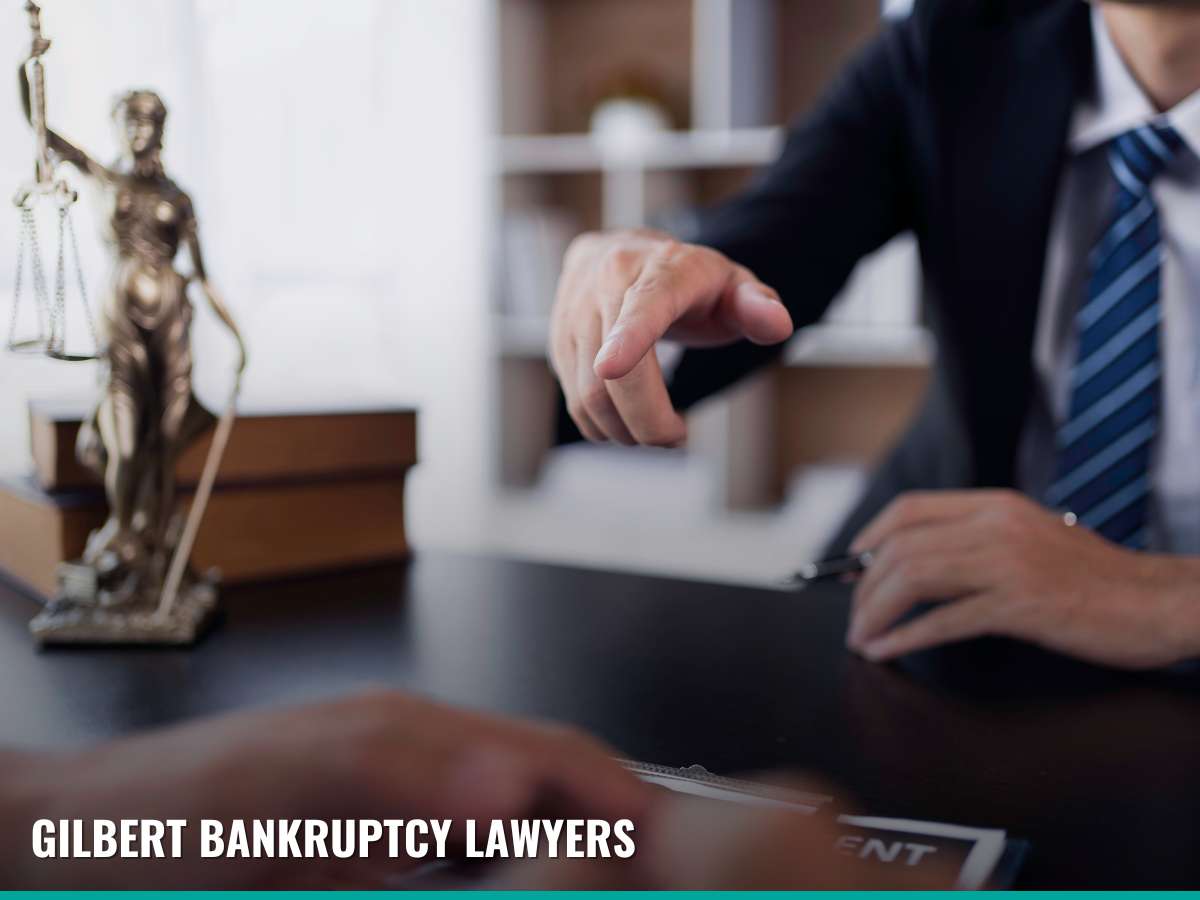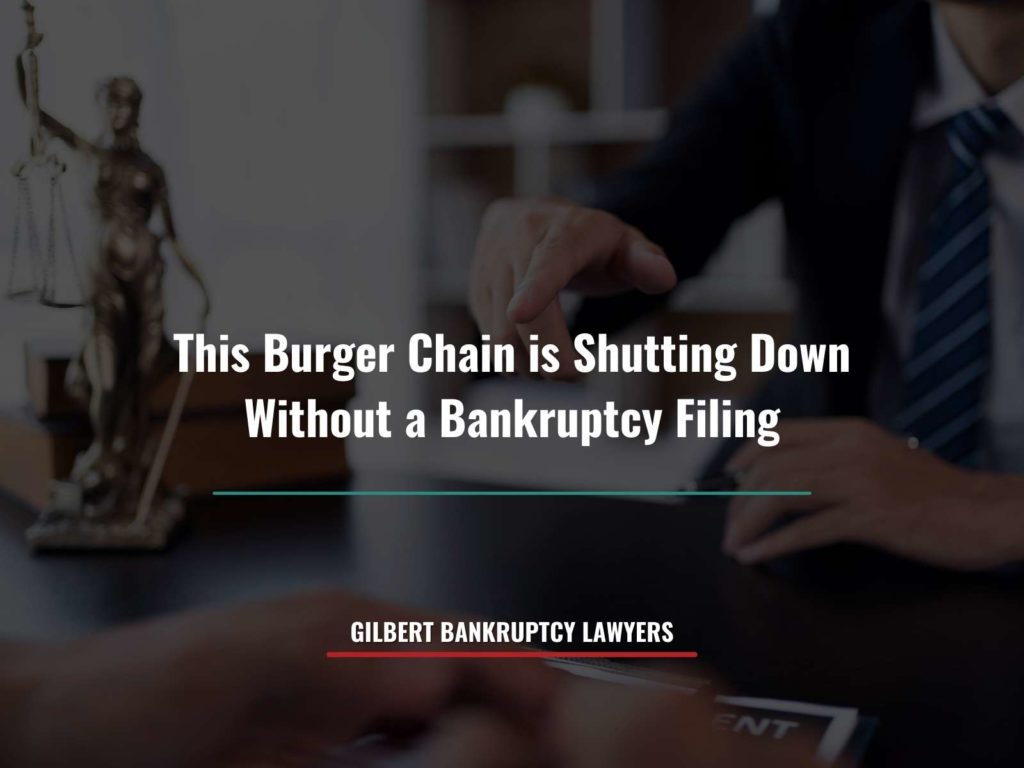It seems like you can’t open a news website these days without reading about at least one major company declaring bankruptcy. Some businesses were hit hard by the pandemic and never fully recovered. Others have struggled to adjust to post-pandemic consumer habits. Many industries are seeing increasing competition from online sources and need to transition away from a brick-and-mortar business strategy. No matter the reason for a company’s financial struggles, bankruptcy is usually able to assist and provide protection from creditors. However, the latest business to shut down for good isn’t doing so through a bankruptcy filing. Read on to learn more about how this fast-food restaurant has avoided filing for bankruptcy despite declining revenue and financial struggles. To schedule your free debt relief consultation with an experienced Phoenix-area bankruptcy lawyer, call 480-448-9800.

The Latest Restaurant Chain to Fall
Bagger Dave’s is a burger chain with locations in Indiana, Michigan, and Ohio. At its peak, the chain had 28 locations. It was also known for serving pizza baked in pizza ovens. But it has failed to thrive and its operator, BT Brands, is planning on taking the stores in a different direction. While some companies might sell or file for bankruptcy, BT Brands plans to repurpose existing locations into a new restaurant concept. They have six stores remaining which are worth a reported $5 million. They range from 4,000 to 6,000 square feet and have liquor licenses. This could provide BT Brands with a blank canvas with which to create a new fast-casual chain restaurant. This also means Bagger Dave’s employees won’t have to seek out new employment and shareholders won’t see losses like those observed when a company declares bankruptcy.
Bagger Dave’s is far from the only restaurant to experience financial difficulties resulting in a bankruptcy filing or even a total shutdown. Bagger Dave’s closure puts it among the likes of:
- California Pizza Kitchen: While this restaurant is still operating, it had to close several franchise locations due to pandemic struggles. It has focused its brand on bake-at-home frozen pizzas.
- Ruby Tuesday: This is another example of a restaurant that used Chapter 11 bankruptcy to stay in business despite declining revenue.
- Sizzler: The casual pizza chain was forced into bankruptcy by the COVID-19 pandemic. Its bankruptcy goal was to reduce debt and renegotiate its restaurant leases.
- Chuck E. Cheese: This kids’ pizza and entertainment chain was hit especially hard by pandemic quarantine procedures. Its debt was listed at over $1 billion on its bankruptcy petition.
- Sweet Tomatoes: This buffet chain saw no feasible way to navigate COVID-19 changes with its debts and used bankruptcy to shut down its operations.
The Different Chapters of Bankruptcy
When larger companies declare bankruptcy, they usually use chapter 11 bankruptcy. Businesses can also use chapter 7 bankruptcy to shut down their operations. Individuals can use chapter 7, chapter 11, or chapter 13 bankruptcy to discharge personal debts. Chapter 7 and chapter 13 are much more popular than chapter 11, with chapter 7 being the most commonly-filed form of bankruptcy in the United States. Filing any of these forms of bankruptcy will activate the automatic stay, which fends off creditors while the case is in good standing. There is also a court-appointed attorney called the trustee assigned to each bankruptcy case to make sure it is conducted fairly.
Chapter 7 Bankruptcy
Chapter 7 bankruptcy is the most popular because it offers powerful debt relief and is relatively short and simple. It only takes about 3 to 6 months for a chapter 7 bankruptcy debtor to wipe away all of their unsecured debts. Getting rid of credit card debt, medical bills, and other unsecured debts can unburden a debtor and allow them to turn their financial situation around. Many chapter 7 bankruptcy debtors use this legal process to stop lawsuits from creditors, wage garnishments, etc. A business that declares chapter 7 bankruptcy is considered to have gone out of business. However, not everyone qualifies for chapter 7 bankruptcy. While the numbers will vary from state to state, there are only a few ways to income-qualify for chapter 7 bankruptcy. A debtor whose household income falls below the state median household income (based on their household size) will qualify for chapter 7 bankruptcy. A debtor can also use the means test, which indicates a debtor’s disposable monthly income, to qualify for chapter 7 bankruptcy. Unsure if you are eligible for chapter 7 bankruptcy in Phoenix, Arizona? Call 480-448-9800 to schedule your free consultation with one of our experienced bankruptcy lawyers.
Chapter 13 Bankruptcy
Chapter 13 bankruptcy is sometimes a debtor’s alternative to chapter 7 bankruptcy, but it is also often a debtor’s first choice. Because it pays debts off in a restructured payment plan, it has benefits that are unique from chapter 7 bankruptcy. Not only is it an option for debtors with income too high to qualify for chapter 7- it can also be used to pay off secured debts and priority debts that would remain with a debtor after a chapter 7 bankruptcy filing. The plan lasts 3 years for debtors whose income qualifies them for chapter 7 bankruptcy, and 5 years for a debtor whose income exceeds state medians. Are you curious about what your payment plan would look like in a chapter 13 bankruptcy and the benefits that filing your petition would entail? Learn more about the chapter 13 process in Arizona with your free consultation with a dedicated member of our bankruptcy team- call 480-448-9800 to get started.
Chapter 11 Bankruptcy
Chapter 11 bankruptcy is not most debtor’s first choice in bankruptcy. It is far too complex and costly for the average bankruptcy debtor. Individuals with high assets and liabilities or companies that want to stay in business see the most advantage from filing for chapter 11 bankruptcy. When a debtor declares chapter 11 bankruptcy, their primary creditors form a committee that has input on influential decisions in how the debtor operates. Small business owners can bypass this process if they qualify for a small business filing or a subchapter V chapter 11 bankruptcy.
Filing a Personal or Small Business Bankruptcy in Phoenix, Arizona? Start Here for Reliable, Affordable Legal Representation
Selecting a bankruptcy chapter is just one of the several decisions you will have to make during the bankruptcy process in Arizona. You must have an accurate view of your assets in addition to your income so that you can apply exemptions to protect them throughout your bankruptcy case. Your creditors can file adversary proceedings that will delay the process and may result in some of your debts not being cleared by your bankruptcy. But Gilbert Bankruptcy Lawyers can help you avoid issues like these and any others that arise throughout your unique case. If you’re seeking quality legal help with your Phoenix bankruptcy, we hope to be one of your top options. Our firm offers payment plan options that are flexible to fit with your budget- you may qualify to file your case for as little as zero dollars down! When you’re ready to get started with your free consultation by phone, call our office at 480-448-9800.
Gilbert Bankruptcy Lawyers
Office: 480-448-9800
Email: info@myazlawyers.com
Website: https://gilbertbankruptcylawyers.com
Additional Information at:
Phoenix Bankruptcy Lawyer
Mesa Bankruptcy Lawyers
Phoenix DUI Lawyer
Chandler Bankruptcy Lawyer
Tempe Bankruptcy Lawyers
Vegas Zero Down Bankruptcy Attorney
Gilbert Bankruptcy Lawyers
Tucson Bankruptcy Lawyer
Arizona Zero Down DUI
Las Vegas Bankruptcy Lawyers
AZ Bankruptcy Lawyer
